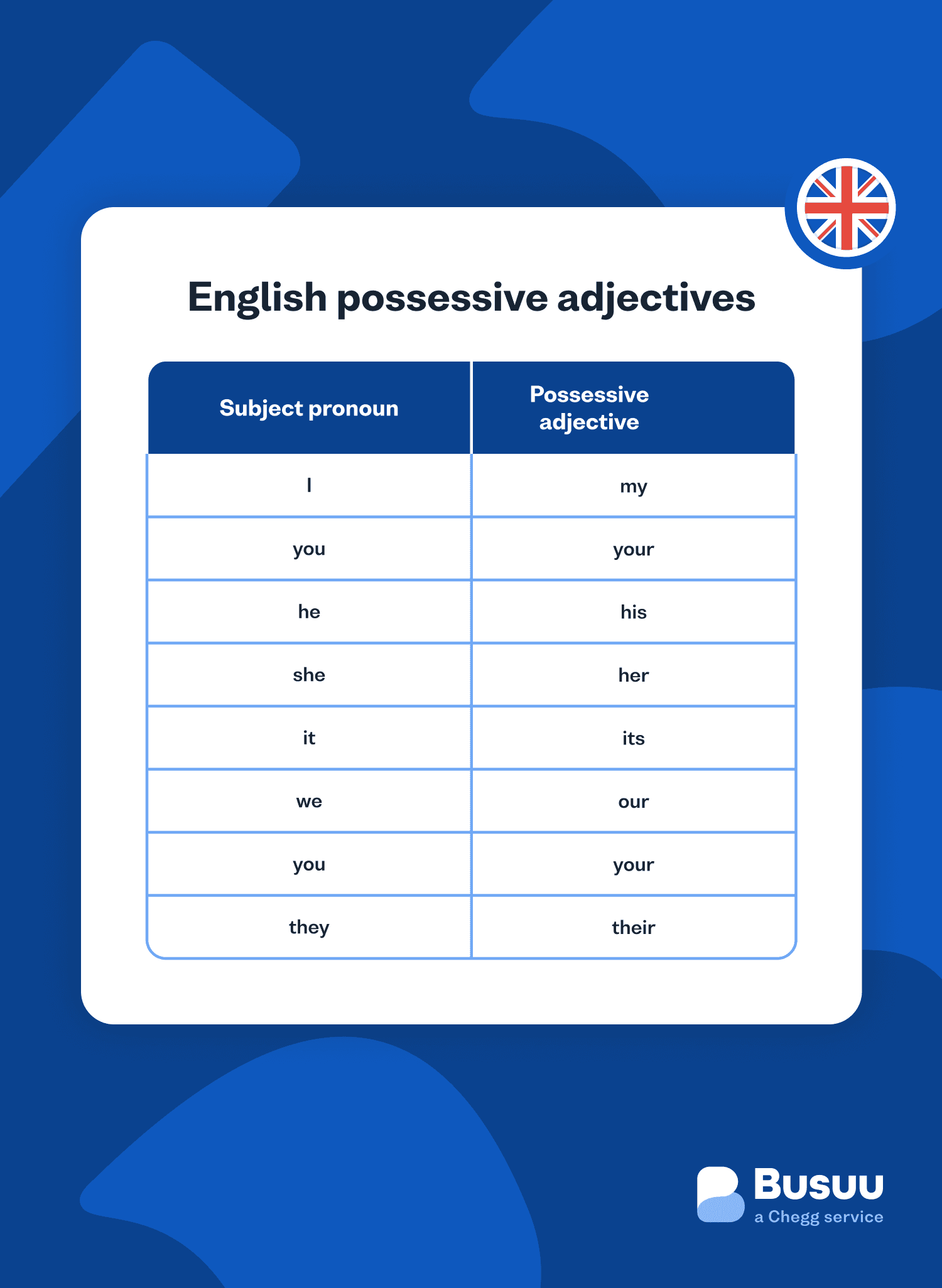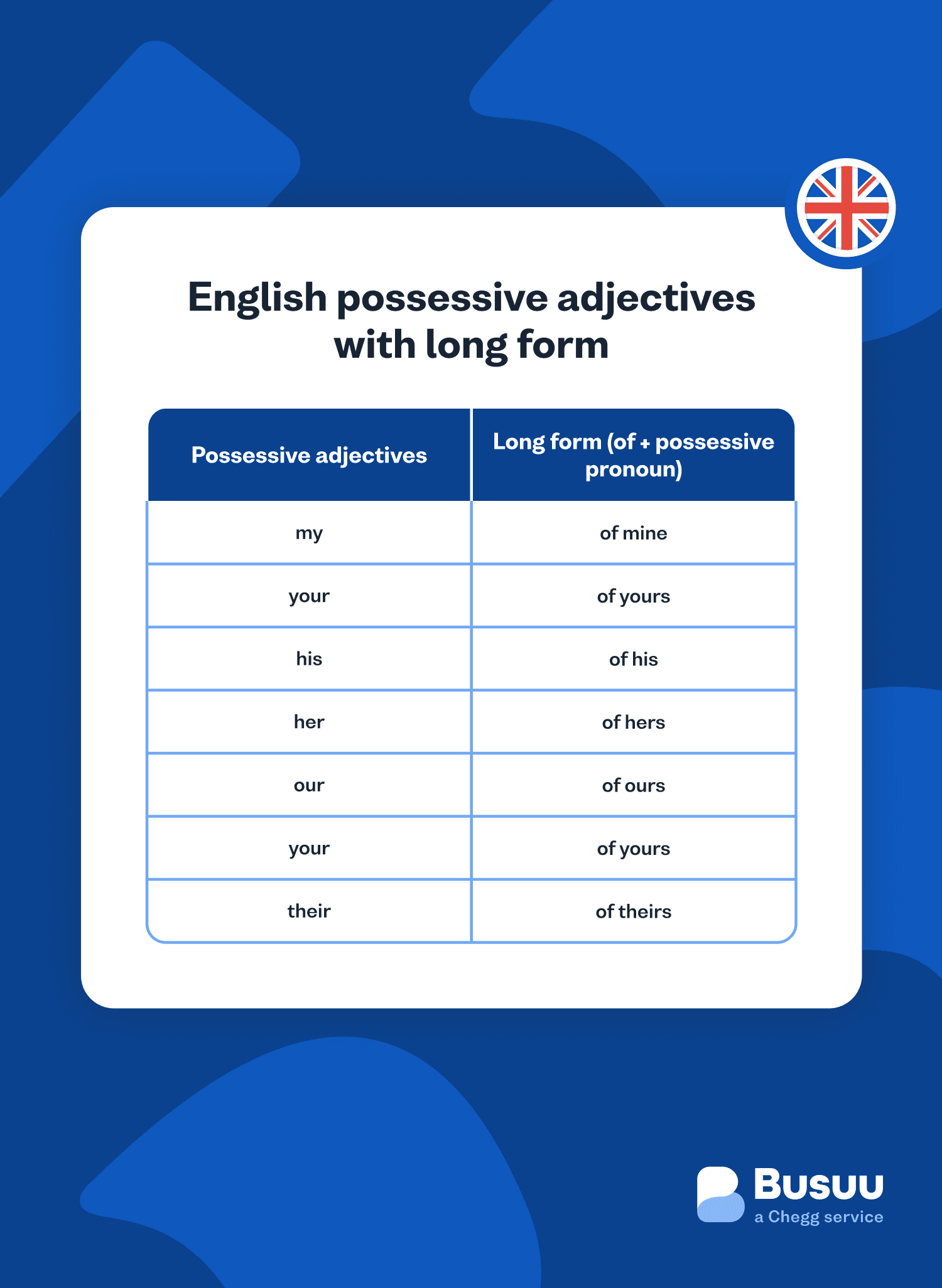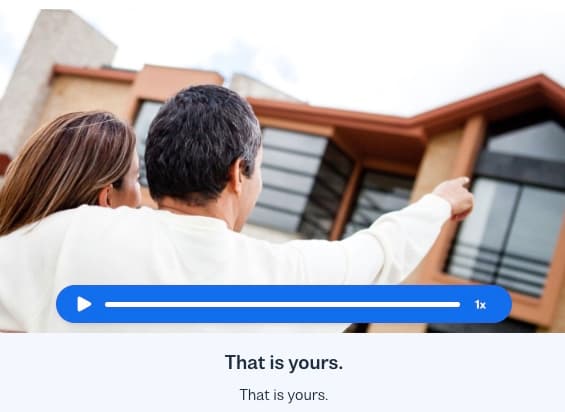I want to learn...
Author:

Chiara Pegoraro
Possessive articles and pronouns are those words that will help you identify the many ways something can belong to someone. Either it’s your arm, or belief, or mother, these words will create an immediate connection in the mind of a listener so they are definitely worth learning.
In this article you will learn more about possessive adjectives, the different types, examples, how and how to use them and avoid common mistakes in your daily conversations.
Let’s start!
What are possessive adjectives
Grammar terminology can sometimes look a little obscure, but this is not the case for possessive adjectives. These are in fact adjectives that indicate… possession.
It can be something that belongs to you, like a book, a house, an item of clothing: my book, your house, her dress…
It can be someone that you are related to or connected in some form: my mother, your boyfriend, her boss…
It also can be a part of your body: my eyes, your legs, her hair…
In this article you will learn about possessive adjectives, how to use them, which type you need to use in a situation and also the most common mistakes related to them.
English has seven possessive adjectives, each linked to a subject pronoun. Let’s look at the chart:

Possessive adjectives
| Subject pronoun | Possessive adjective |
|---|---|
| I | my |
| you | your |
| he | his |
| she | her |
| it | its |
| we | our |
| you | your |
| they | their |
The first thing that we can notice is that we have the same forms for singular and plural. English, in fact, doesn't differentiate between singular and plural you or your. One less thing to learn!
Let’s see a few examples of how we would use these in a sentence:
I invited Christian and Laura to my house.
Tim, you haven’t shown me your new car yet.
Amir needs to take his medicine now.
Sandra is coming in her car.
This bar is well known for its comfy chairs and cozy atmosphere.
We are going to our parents’ home tomorrow.
Are you guys going back in your car?
They don’t know at what time their flight will leave tomorrow.
As we can see, the adjectives are always before the name they refer to: my house, his medicine, our parents, their flight. Even in the case when there are multiple adjectives (that would be a word that defines a quality of a noun) the possessive always comes first: your new car, its comfy chairs, my new yellow bikini.
Long form possessive adjectives
Possession can be conveyed using a variety of grammar structures. One of these is the combination of + possessive pronouns which are often called long form or stressed adjectives although both of these terms are not grammarly precise.
The form we are referring to is this:
A friend of mine told me that this book is interesting.
We could say my friend, it would be perfectly acceptable but these two expressions have different nuances to them. When we say my friend we are making an assumption that the person we are talking to knows what friend we are talking about because we have previously referred to him or her. Otherwise, they might think that we have only one friend in the whole world and it would sound a little weird. So, to give the nuance that we are talking about a friend among many, we say a friend of mine.
Here are all the forms:

Table of possessive adjectives with long form
| Possessive adjectives | Long form (of + possessive pronoun) |
|---|---|
| my | of mine |
| your | of yours |
| his | of hisù |
| her | of hers |
| our | of ours |
| your | of yours |
| their | of theirs |
We can notice that they are quite similar to the adjectives, in fact, in most cases it’s sufficient to add a final s to the adjective.
Here is how we would use these forms in context:
I was talking to that friend of yours, Alex.
I think he is a great cook. I wish I could taste a dish of his.
Michelle is very jealous of her things, she would never let me borrow a book of hers.
The Johnsons are very proud of their family tradition, attending a party of theirs is a pure joy.
In all of these cases we communicate that the thing we are talking about is just one of many, whether it is friends, dishes, books or parties.
You also might have noticed that there is one form missing in this list. In fact, we can’t use this form with inanimate objects.
The library is famous for its collection of books.
It’s not possible to talk about a “book of its”, it would not make sense in English. These forms are only for human beings and some animals. Look at this sentence about a dog named Cinnamon:
Cinnamon is very peaceful but she will become aggressive if you harm one of her puppies.
We could also say:
Cinnamon is very peaceful, but she will become aggressive if you harm a puppy of hers.
Both sentences refer to a dog name Cinnamon and her well-protected babies.
Now that we got here, let’s proceed a little further and see a different use of these forms that will make you sound like a native speaker.
Possessive pronouns and how they substitute possessive adjectives
Let’s imagine a dialogue. You are leaving a bar and on the chair next to the one you were sitting, there is a black and white baseball hat. A kind stranger, picks the hat, follows you in the street and asks:
Excuse me! Is this your black and white baseball hat?
Sounds a bit long, doesn’t it? Luckily there is a grammar structure that will make everything easier and faster. Instead of describing the object that he’s waving at you, the kind stranger could just say:
Excuse me! Is this yours?
In this case “yours” stands for “your black and white baseball hat”. Pretty useful. Pronouns make it possible not to repeat information that is obvious from context.
Take a look at the pronouns’ forms:
Table of possessive pronouns
| Subject pronoun | Possessive pronoun |
|---|---|
| I | mine |
| you | yours |
| he | his |
| she | hers |
| it | its |
| we | ours |
| you | yours |
| they | theirs |
Not much surprise here, right? These are the exactly same forms that we have seen following of in the previous chart. Let’s see a few examples on how to use these forms in context.
* Is that Jane’s house?
*No, it’s mine. (mine = my house)
Are these keys yours? (yours = your keys)
No. Ask Susan, I think they're hers.
Their house is right next to ours. (ours = our house)
As you can see pronouns are common in dialogues revolving around the same object. A simple and easy way to avoid repetition. Even if it sounds easy though, there are a number of mistakes that can still be made.
How to avoid the most common mistakes
In written English, some of the most common mistakes concern possessive adjectives and pronouns, especially considering the fact that these forms don’t have an apostrophe, as you can see from the table below.
Common spelling mistakes
| Correct form | Mistake |
|---|---|
| your | you’re (which means you are) |
| its | it’s (which means it is or it has) |
| hers | her’s (which is never correct) |
| ours | our’s (which is never correct) |
| theirs | their’s (which is never correct) |
These are very common mistakes that even a lot of native English speakers make. Try not to get these words mixed up.
Wrapping up
We have seen the different ways you can express possession in English. You can use the possessive adjectives to say this is my friend Alice or you might want to use the long form a friend of mine, Alice depending on the nuance that you’re going for.
Now you are also able to use a possessive pronoun so you don’t have to make unnecessary repetitions and you are also aware of the fact that there are many spelling mistakes regarding these words. You are good to go, but the learning doesn’t need to stop here.
AUTHOR

Chiara Pegoraro
Newlanguages


